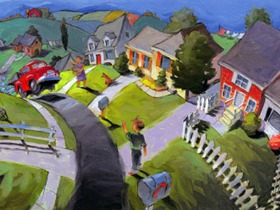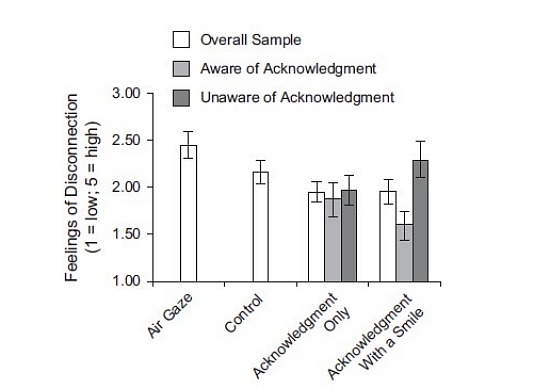What's Hot: Did January Mark The Bottom For The DC-Area Housing Market? | The Roller Coaster Development Scene In Tenleytown and AU Park
 Be a Good Neighbor, Make Eye Contact
Be a Good Neighbor, Make Eye Contact
✉️ Want to forward this article? Click here.

In a recent piece from The Atlantic Cities, Tyler Falk investigated the idea that a gesture as effortless as eye contact can make neighbors feel less like strangers.
Besides some non-scientific data that the author notes on one his daily walks (not much eye contact in Capitol Hill, it seems), Falk cites a recently-published study out of Purdue University. In “To Be Looked at as Though Air: Civil Attention Matters,” psychology professor Eric D. Wesselmann attempted to determine if making or not making eye contact with a stranger has any affect on feelings of disconnection.
From the study:
“Because social connections are fundamental to survival, researchers argue that humans evolved systems to detect the slightest cues of inclusion or exclusion. For example, simple eye contact is sufficient to convey inclusion. In contrast, withholding eye contact can signal exclusion. Even though one person looks in the general direction of another, no eye contact is made, and the latter feels invisible.”
The researchers had a woman walk around a college campus and either look through someone without acknowledging them, make eye contact, or make eye contact and smile. Another researcher then asked the people how disconnected they felt from others (the woman and the researcher did not reveal their connection).

The results, courtesy of Atlantic Cities.
As to be expected, the people who received the smile felt the least disconnected, and those who were “looked through” felt the most disconnected. While we can’t quite extrapolate the findings to larger metropolitan areas — a college campus is a fairly safe community where people presumably feel some sort of connection towards each other already — it is notable that the recipients of the “air gaze” felt even more disconnected than the control group. Looking through someone is worse than doing nothing.
All over DC, new residents are moving next door to people who have been in the same home for decades. Neighborhoods can easily feel fragmented, and neighbors on either side of the new/old divide can feel invisible at times. As we noted in an article from late last year, in 2007, Harvard political scientist and “Bowling Alone“ author Robert Putnam published a widely publicized study that concluded that when neighborhood diversity increases, civic engagement goes down. After interviewing over 30,000 people, Putnam found that people vote and volunteer less, distrust their neighbors more, and give to charity less in mixed neighborhoods.
Maybe making eye contact with our neighbors is one small way in which we can get a little closer to being, as Mayor Gray wants, “One City.“
What do you think? How much eye contact do you notice in your neighborhood?
See other articles related to: atlantic cities, eye contact, gentrification
This article originally published at http://dc.urbanturf.production.logicbrush.com/articles/blog/be_a_good_neighbor_by_making_eye_contact/5611.
Most Popular... This Week • Last 30 Days • Ever

As mortgage rates have more than doubled from their historic lows over the last coupl... read »

The small handful of projects in the pipeline are either moving full steam ahead, get... read »

The longtime political strategist and pollster who has advised everyone from Presiden... read »

Lincoln-Westmoreland Housing is moving forward with plans to replace an aging Shaw af... read »

A report out today finds early signs that the spring could be a busy market.... read »
DC Real Estate Guides
Short guides to navigating the DC-area real estate market
We've collected all our helpful guides for buying, selling and renting in and around Washington, DC in one place. Start browsing below!
First-Timer Primers
Intro guides for first-time home buyers
Unique Spaces
Awesome and unusual real estate from across the DC Metro













